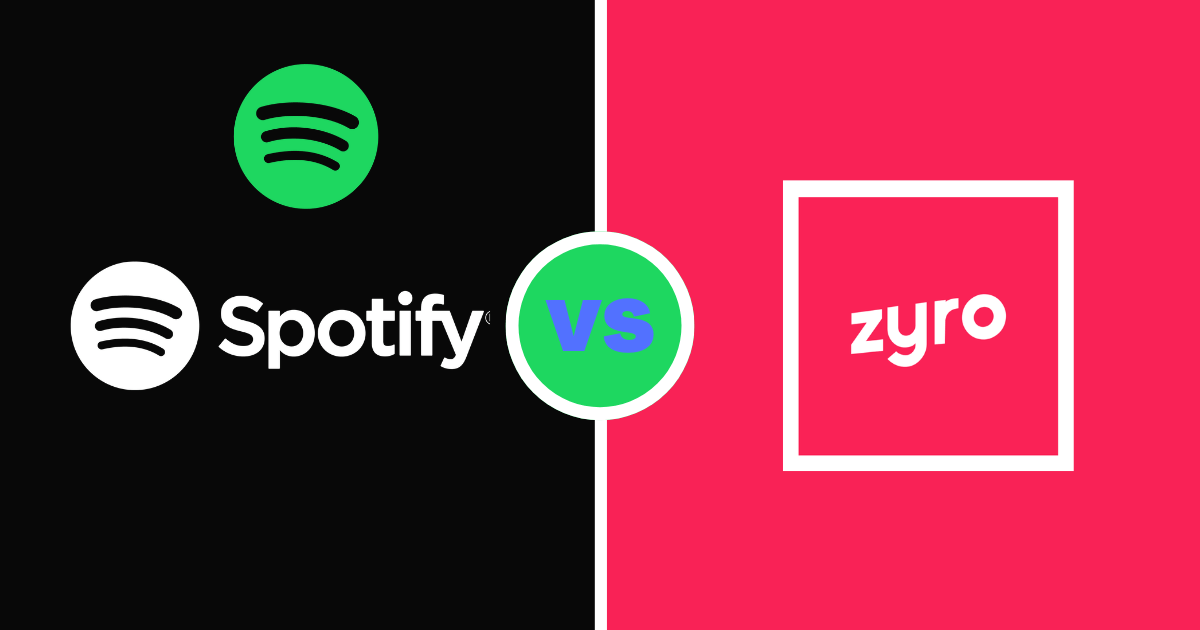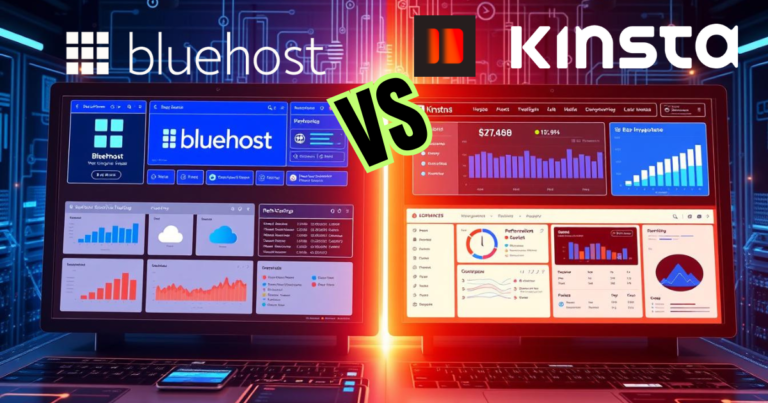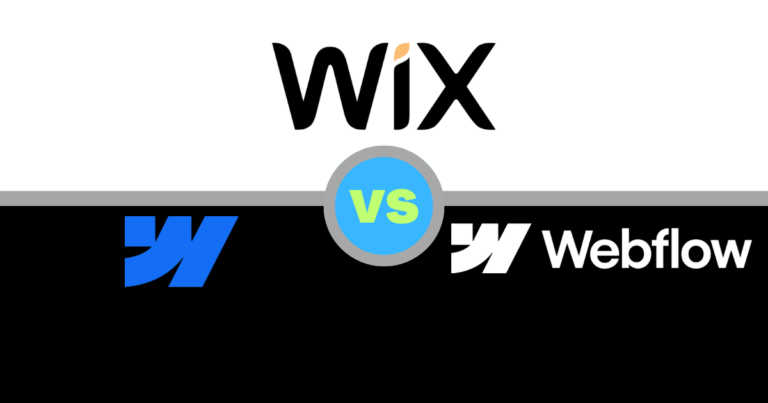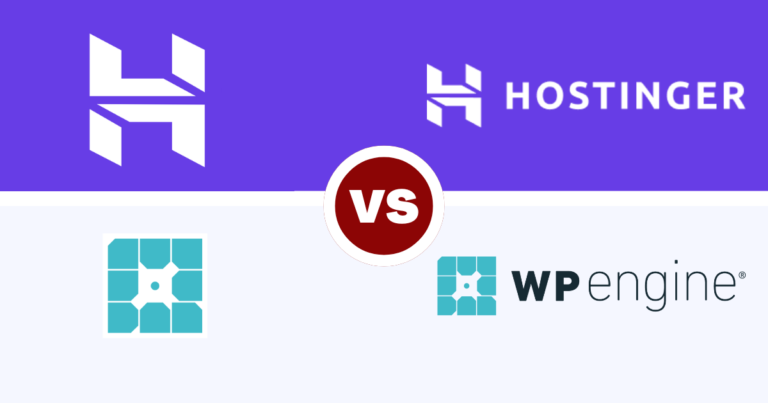Shopify vs Zyro: Best Platform for Your Online Store
In the world of ecommerce, choosing the right platform is crucial. With many options available, picking the best one for your business can be tough. Which platform – Shopify vs Zyro – is the best for your online store? We’ll dive into the features and benefits of both to guide your choice in this Shopify vs Zyro comparison.
Key Takeaways
- Zyro offers over 100 free templates, while Shopify has around 170 themes1
- Shopify charges about $180 for a premium theme, but Zyro’s templates are free1
- Zyro is great for beginners, while Shopify is better for growing stores1
- Shopify has five plans from $5 to $2000 monthly, and Zyro starts at $2.592
- Zyro’s website builder starts at $1.89 monthly, and Shopify starts at $293
Understanding Platform Basics
Choosing the right platform is key for an online presence. Shopify and Zyro are two popular choices. Each has its own strengths and differences.
What is Shopify?
Shopify is a platform for online and offline sales. It offers tools for inventory management and advanced reporting4. Shopify plans range from $19 to $299 per month, fitting all business sizes4. It also charges fees from 2.9% + 30¢ to 2.4% + 30¢ per sale4.
What is Zyro?
Zyro is a drag-and-drop website creation with e-commerce features. It’s good for many website types5. Zyro has plans starting at $2.90 per month, with no extra transaction fees5.
Key Platform Differences
Shopify and Zyro serve the e-commerce market but differently. Shopify has many e-commerce tools and an app ecosystem4. Zyro is easy to use and has AI tools for website creation5.
In summary, Shopify is great for businesses needing lots of features. Zyro is more affordable and easy to use for e-commerce. Knowing what each platform offers helps choose the best for your online business45.
Design and Templates Comparison
Zyro and Shopify both have a lot to offer when it comes to website design and templates. Zyro has over 100 mobile-responsive templates in nine categories. This gives users a wide range of choices6. Shopify, on the other hand, has around 170 themes, with about 10 free ones and many premium ones for sale7.
Zyro’s design options are a bit more basic, but it’s easy to use. This makes it great for people who aren’t tech-savvy. Shopify, though, lets you dive deeper into design with CSS and HTML editing. Both platforms make sure their templates look good on mobile devices and are modern.
| Feature | Zyro | Shopify |
|---|---|---|
| Number of Templates | Over 100 | Around 170 |
| Free Templates | Yes | About 10 |
| Premium Templates | Yes | Yes |
| Customization Options | Limited but user-friendly | Advanced (CSS and HTML editing) |
| Mobile Responsiveness | Yes | Yes |
In summary, both Zyro and Shopify have a lot of website templates and themes to pick from. Zyro is easier to use and more streamlined. Shopify, though, offers more customization options for those who want more control over their design.
Ease of Use and Interface
Shopify and Zyro are both easy to use, making them great for people of all tech skills. Zyro has a grid-based editor with drag-and-drop functionality for a smooth building experience, even for beginners8. Shopify also has a drag-and-drop interface that’s easy for new users. It also has advanced options like CSS and HTML for those who know more about tech8.
Dashboard Navigation
Both platforms have dashboards that make managing an online store easy. Shopify’s dashboard gives you a clear view of analytics, inventory, and marketing tools8. Zyro’s dashboard is simpler but still lets you access important functions easily, making it good for those who want a clean user interface8.
Website Building Experience
Zyro and Shopify take different approaches to building websites. Zyro uses AI-based site design suggestions and simple templates that are great for beginners8. Shopify offers more templates and customization, but it might be harder for those new to web design8.
Learning Curve Analysis
The learning curve can differ between Shopify and Zyro. Zyro’s website editor and drag-and-drop functionality make it easy for new users to start, with a quick onboarding process8. Shopify has more features and customization, but it might take longer to learn, mainly for e-commerce newbies8. Still, Shopify’s detailed documentation and community support can help with the learning process for those willing to put in the effort.
| Feature | Shopify | Zyro |
|---|---|---|
| Drag-and-drop Functionality | ✓ | ✓ |
| Website Editor Complexity | Moderate | Beginner-friendly |
| Learning Curve | Moderate | Easy |
| Dashboard Navigation | Comprehensive | Straightforward |
In summary, both Shopify and Zyro are easy to use and offer great website building experiences. Zyro is better for beginners, but Shopify’s features and customization make it great for businesses looking to grow8.
E-commerce Features and Capabilities
Both Shopify and Zyro have strong e-commerce features for online businesses9. Zyro accepts over 20 payment methods worldwide, boosting its global sales9. Shopify offers hundreds of themes and storefronts for customization9. It also connects online stores with physical shops through Shopify POS, syncing stock and orders in real-time.
9 Zyro integrates with Facebook tools like Messenger and Analytics, improving marketing and analytics9. Shopify has a huge app store with thousands of tools, including for marketing and cart recovery9. But, Shopify might cost more due to fees and app prices, making Zyro a cheaper choice.
9 Zyro is great for small stores wanting simplicity and affordability9. Shopify is better for businesses needing advanced features and customization9. Both offer SEO tools, but Shopify’s app store has more SEO options for better online visibility.
| Feature | Shopify | Zyro |
|---|---|---|
| Payment Gateways | Multiple options, including Shopify Payments | Over 20 payment methods globally |
| Product Management | 10Unlimited products, no bandwidth limitations | Basic inventory management |
| Transaction Fees | 10Up to 2% transaction fee for non-Shopify Payments | No transaction fees |
| Integrations | 9Large app store with thousands of plugins | 9Native integrations with Facebook tools |
| Suitability | 9Recommended for businesses needing advanced features and scalability | 9Suitable for small online stores seeking simplicity and affordability |
Shopify vs Zyro: Pricing Structure
When looking at ecommerce pricing, it’s important to compare subscription plans and hidden costs. Shopify and Zyro have different pricing structures. Each has its own benefits and things to consider for online businesses11.
Plan Comparison
Shopify has a wide range of pricing options. It includes a 14-day free trial and three paid plans: Basic Shopify ($32/month), Shopify ($92/month), and Advanced Shopify ($399/month)12. Zyro, on the other hand, has four paid plans without a free option. It does offer a 30-day money-back guarantee11.
Hidden Costs and Transaction Fees
Zyro’s pricing plans don’t have any extra transaction fees11. Shopify, though, charges transaction fees for sales made through other payment methods. This is unless you use Shopify Payments. The Basic plan gets a promotional $1 per month for the first three months11.
Value for Money Analysis
Zyro’s plans are more affordable. This makes it a good choice for individuals and small businesses looking for an easy-to-use ecommerce solution11. Shopify’s higher-priced plans, though, offer more advanced features and customization options. They also provide comprehensive support, which is great for businesses looking to grow online11.
In the end, choosing between Shopify and Zyro depends on your business needs, budget, and growth goals. It’s key to look at the pricing structures, hidden costs, and what each platform offers. This will help you find the best ecommerce solution for your online store.
Marketing and SEO Tools
Online businesses need strong marketing and SEO tools to stand out. Shopify and Zyro offer different ways to help users with their digital marketing.
Shopify has a wide range of SEO tools. Users can change meta tags, optimize page titles, and use an automatic redirect system. This helps make their website more visible and easier to find13. Zyro uses AI to help users. It has a slogan generator and basic SEO settings to improve their online presence.
Both platforms let users connect with big marketing and analytics tools like Google Analytics and Facebook Pixel. This helps track website performance and get important insights14. But Shopify’s marketing tools are more detailed, fitting various business needs. Zyro is simpler and uses AI to help.
Choosing between Shopify and Zyro depends on what the business needs. Shopify is great for those wanting a wide range of marketing tools. Zyro is better for those who value ease and AI help.

“Effective digital marketing and SEO are essential for any online business to thrive in the competitive e-commerce landscape.”
Using the right tools and integrations can make a website more visible. It can also drive more targeted traffic. This can help increase online sales and revenue131415.
Apps and Integrations
Expanding your online store’s functionality is key. Shopify’s app marketplace and third-party integrations are crucial. It has over 5,000 free and paid apps for various business needs16. Zyro offers fewer options but includes AI tools like a logo maker and business name generator16.
Shopify’s app store is vast, offering customization and specialized features. This makes it great for growing businesses16. Zyro focuses on essential integrations for small businesses, like Facebook Messenger and Google Analytics16.
App Marketplace Comparison
Shopify’s App Store has a huge selection of apps. You can integrate marketing, sales, inventory, and shipping tools into your store16. Zyro’s integration options are fewer but still cover the basics for small businesses16.
Third-party Integration Options
Shopify’s wide range of integrations lets you connect with many platforms and services. This flexibility helps you tailor your store to your business needs16. Zyro offers fewer options but still has key tools like Facebook Messenger and Google Analytics for small businesses16.
Essential Business Tools
Zyro shines with its AI tools, like the logo maker and business name generator. These are great for entrepreneurs and small business owners17. Shopify, with its vast app marketplace, offers more integrations and apps for complex needs16.
“Zyro’s emphasis on AI-powered business tools can be a game-changer for entrepreneurs and small businesses looking to establish a professional online presence with minimal effort.”
Customer Support and Resources
Shopify and Zyro both offer great help to their users. Shopify has support available 24/7 through email, live chat, and phone. This means customers can get help anytime they need it for technical issues or just questions18. But, because Shopify has more users, it might take a bit longer to get a response.
Zyro also has 24/7 support through email and live chat, and they usually respond faster19. Both platforms have lots of guides and documents to help users understand their features. Shopify also has a community forum where users can help each other out.
| Feature | Shopify | Zyro |
|---|---|---|
| Support Channels | Email, Live Chat, Phone | Email, Live Chat |
| Support Availability | 24/7 | 24/7 |
| Response Time | Slower due to higher volume | Generally quicker |
| Help Documentation | Extensive, Community Forum | Extensive |
Zyro’s support is quicker, but Shopify has more ways to get help and lots of resources. Both platforms are good at helping their users with technical issues and answering questions. They both have detailed guides and support to help you out.
Pros and Cons
Shopify and Zyro have their own strengths and weaknesses. Shopify is great for big businesses and growing stores because of its many features and scalability. But, it can be pricey and has fees for some transactions5. Zyro is more affordable and easy to use, perfect for small businesses and those on a tight budget5. Yet, it might not have enough advanced features for bigger e-commerce sites.
Shopify’s Pros:
- It has lots of e-commerce tools, like inventory management and marketing tools
- It has over 8,000 apps to make your store better2
- It can grow with your business19
Shopify’s Cons:
Zyro’s Pros:
- It’s cheap, starting at $2.59 a month2
- It’s easy to use with a drag-and-drop interface and AI tools5
- It doesn’t charge transaction fees19
Zyro’s Cons:
- It has limited customization and fewer advanced features5
- It doesn’t have a free plan, but offers a 30-day money-back guarantee2
Choosing between Shopify and Zyro depends on your business needs and budget. Both platforms have their own benefits and drawbacks, suited for different types of businesses.
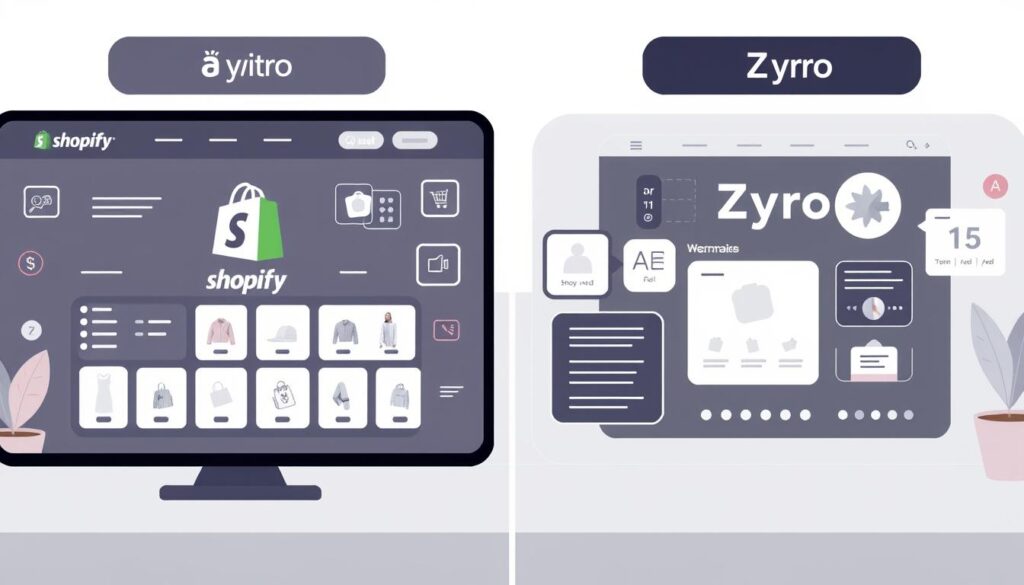
| Feature | Shopify | Zyro |
|---|---|---|
| Pricing | $29 – $299 per month195 | $2.59 – $21.99 per month25 |
| Free Trial | 14 days19 | 30-day money-back guarantee2 |
| Templates and Customization | Over 100 highly-responsive themes, both paid and free2 | Drag-and-drop editing with predefined templates2 |
| Apps and Integrations | Over 8,000 apps for added functionality2 | Integrates with messengers like WhatsApp and Facebook Messenger2 |
| Inventory Management | Robust features, including inventory tracking, product variations inventory, and a mobile app2 | Limited details provided on inventory management capabilities |
| Customer Support | 24/7 support via phone, email, and live chat5 | Live chat and email support, no phone support5 |
Both Shopify and Zyro offer unique strengths, catering to different business needs and budgets. Ultimately, the choice will depend on the specific requirements and priorities of your online venture.
Alternatives
Shopify and Zyro are well-known ecommerce platforms. But, there are other options that might be better for your business. Let’s look at some top alternatives and website builders with unique features and prices.
Wix is a versatile website builder with strong ecommerce features. It has over 500 ecommerce templates for different industries and styles20. Wix’s ecommerce plans cost from $29 to $159 a month, offering various features and storage for different business sizes20.
Squarespace is another choice, focusing on design with ecommerce features. It has a user-friendly interface and lots of customization options. This makes it perfect for businesses that want a beautiful online look.
BigCommerce is great for those needing a more advanced ecommerce solution like Shopify. It has tools and features for complex online sales.
When looking for alternatives, think about your business’s needs, budget, and growth. Consider design flexibility, ease of use, ecommerce features, and customer support in your decision.
Junia AI and Weblium are new ecommerce platform alternatives to check out. Junia AI21 uses AI for design and customization. Weblium21 is all about easy content creation and SEO, for businesses that value simplicity and design.
By comparing these alternatives, you can find the perfect platform for your online store. This ensures your business can succeed in the digital world.
Personal Experience
Our exploration of Shopify and Zyro has been enlightening. Users share varied experiences based on their needs and tech skills7. Shopify attracts those wanting a rich feature set and growth potential7. On the other hand, Zyro appeals to small businesses and startups with its ease and affordable prices6.
Shopify’s steeper learning curve is a challenge for some. Yet, many find it’s worth the effort7. Zyro’s simplicity and no transaction fees win over those wanting a quick online start6.
The choice between Shopify and Zyro depends on the user’s needs and skills. Both platforms have their advantages. The decision should consider desired features, budget, and business strategy76.
“Zyro has been a game-changer for our small business. The simplicity of the platform and the affordability of the plans have allowed us to quickly establish an online presence without breaking the bank.” – Jane Doe, Small Business Owner
| Feature | Shopify | Zyro |
|---|---|---|
| Pricing |
|
|
| Customization | Highly customizable | Moderately customizable |
| Ease of Use | Steeper learning curve | Straightforward and user-friendly |
Both Shopify and Zyro are strong options for online businesses. The right choice depends on the user’s specific needs and preferences76.
Conclusion
Choosing the right platform for your online store is crucial. Shopify and Zyro each have their own benefits. Shopify is great for businesses looking to grow and scale, with lots of features and customization options22.
It has over 1,000,000 online stores and various pricing plans for all sizes. This makes it perfect for big businesses wanting to grow their e-commerce22.
Zyro, on the other hand, is perfect for beginners and small businesses. It’s affordable and easy to use, with basic e-commerce features23. Starting at $2.90 per month, Zyro helps you set up an online store without needing to be tech-savvy2324.
So, the choice between Shopify and Zyro depends on your business goals, technical skills, and budget. Both platforms have their strengths and can meet different needs. Take time to look at each platform’s features, pricing, and reviews to find the best one for your online business23.
Source Links
- https://www.websiteplanet.com/blog/zyro-vs-shopify/ – Zyro vs Shopify – Which One Is Actually Better? [2024]
- https://avada.io/blog/shopify-vs-zyro/ – Shopify vs Zyro: Which One is Better for Online Store?
- https://www.olitt.com/blog/zyro-vs-shopify/ – Zyro Vs Shopify: Which One Is The Best For Online Store?
- https://www.mageplaza.com/blog/shopify-solution/zyro-vs-shopify.html – Zyro vs Shopify: Who Wins on E-commerce Battle?
- https://www.linkedin.com/pulse/zyro-vs-shopify-olusola-david-hgnbf – Zyro vs Shopify: Which Platform is Better?
- https://www.websitebuilderexpert.com/ecommerce-website-builders/zyro-review/ – Zyro Review: Is It Right for Your Business?
- https://medium.com/@maggieb.farrier/shopify-vs-squarespace-vs-zyro-where-to-launch-your-online-business-7bc0f2ec1173 – Shopify vs. Squarespace vs. Zyro: Where to Launch Your Online Business?
- https://www.hulkapps.com/blogs/shopify-hub/shopify-vs-zyro-e-commerce-platform-showdown – Shopify vs Zyro: E-commerce Platform Showdown
- https://aliansoftware.com/shopify-or-zyro-website-builder-what-is-your-choice/ – Shopify or Zyro Website Builder – What is your choice?
- https://www.tooltester.com/en/ecommerce-platforms/ – Ecommerce Platform Comparison Tool: Compare Prices, Features & More!
- https://www.hulkapps.com/blogs/ecommerce-hub/zyro-vs-shopify-who-wins-in-the-e-commerce-battle – Zyro vs Shopify: Who Wins in the E-commerce Battle?
- https://uk.several.com/website-builder/comparison/shopify-wb-vs-zyro – Shopify vs Zyro | Several.com
- https://www.experte.com/website-builder/zyro – Zyro Website Builder Review: Wix Challenger or Just for Beginners?
- https://www.extrabux.com/en/guide/6273450 – Best Website Builder: Squarespace vs. Wix vs. Zyro vs. Godaddy vs. Shopify?
- https://crm.org/news/zyro-review – Zyro Review 2024: Is Zyro Website Builder Any Good?
- https://www.websiteplanet.com/blog/zyro-vs-wordpress/ – Zyro vs WordPress.com – Is the Popular Choice REALLY Better? [2024]
- https://sprout24.com/hub/zyro/ – Zyro Reviews (2024) – Zyro Alternatives & Pricing
- https://bsscommerce.com/shopify/top-website-builders-for-small-business/ – Top Website Builders For Small Business To Grow Faster 2024
- https://medium.com/@maggieb.farrier/shopify-vs-etsy-vs-zyro-choosing-the-best-store-for-a-small-business-3de055c5953 – Shopify vs Etsy vs Zyro: Choosing the Best Store for A Small Business
- https://www.tooltester.com/en/blog/shopify-alternatives/ – 15 Best Shopify Alternatives With Pros and Cons (2024)
- https://medium.com/@jamesgondola/best-zyro-alternatives-in-2024-aa1551cc877e – Best Zyro Alternatives in 2024
- https://creatingawebsitetoday.com/best-ecommerce-website-builders/ – 8 Best eCommerce Website Builders 2024 (Top Researched Picks)
- https://www.yaguara.co/best-ecommerce-website-builder/ – 11 Best eCommerce Website Builders of 2025 (Top Picks)
- https://creatingawebsitetoday.com/zyro-review/ – Zyro Review For 2024 – Pros & Cons (Let’s Review Now)

